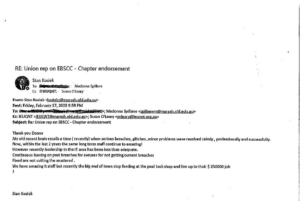
Dismissed teacher claims adverse action after rude ‘reply all’ email
A teacher dismissed by an elite Brisbane school has claimed he experienced adverse action in the aftermath of accidentally sending an inappropriate email to his colleagues. The teacher alleges that he was bullied for making a workplace complaint.
This General Protections (adverse action) case – Kosiek v Marist School Australia Ltd [2023] – is a lesson in always making sure that you double check who you send emails to. In this article, we look at the events leading up to the teacher’s dismissal and the Fair Work Commission’s findings. And we also share an unfair dismissal case involving a worker who was in the habit of sending inappropriate emails to colleagues. But you will be surprised by the Fair Work Commission’s decision. Lets exaimine false accusations that were involved as well.
Teacher lodges adverse action claim after dismissal for accidental email
Stanislaw Kosiek had been a teacher at Marist College Ashgrove in Brisbane for 22 years. The key event in Mr Kosiek’s General protections adverse action claim took place on 17 February 2023. On that day, he unintentionally sent an email with “inappropriate comments” about a fellow employee. Namely, Kevin Berry, the Head of Information Technology at the school.
In this email, Mr Kosiek referred to Mr Berry as “the big end of town” and expressed concerns about the school’s management of IT issues. His email suggested that recent leadership within the IT department had been less than satisfactory. He said that IT staff were “not cutting the mustard.” Mr Kosiek also said that Mr Berry should “stop feeding at the pool tuck shop and live up to their $250,000 job.”
Mr Kosiek had intended to send the email with his union representative, Madonna Spillane. But he mistakenly clicked “reply all,” thereby sending the email to a broader audience. Realising the mistake, he withdrew the offensive comments two days later, attempting to rectify the situation.

Employee is stood down while workplace investigation conducted
However, the damage had been done, and Michael Newman, the Head of College, called Kosiek in for a meeting on February 20. Following this meeting, Mr Kosiek was stood down with pay while the school initiated a workplace investigation into the email incident.
Critical to this adverse action case was the letter Mr Newman sent to Mr Kosiek. In it he expressed concerns that the email may have amounted to bullying. And as such, that it violated the school’s code of conduct and employee privacy policy. He noted that there was “something quite upsetting” about the “tuck shop” reference. And he also took issue with referring to Mr Berry as the “big end of town” and highlighting his salary. Mr Newman stated that the inappropriate email “may amount to serious misconduct.” And that he could be a “breach” of Mr Kosiek’s “personal statutory obligations to ensure the safety and privacy of children in our care.”

Employee responds to letter
It was at this point that Mr Kosiek’s legal representative provided a response to the letter. The letter refuted the accusation that he placed children’s safety and privacy at risk as “simply untrue and outrageous.” And not only did Mr Kosiek believe the allegation untrue. He also stated that the allegation was made “with the intent to cause him undue distress.”
“To make the allegation to a professional who has had children in his care for many decades is highly improper, unnecessary and inflammatory,” wrote Mr Kosiek’s lawyer in the letter. In response to the letter, Mr Newman offered an apology for calling out the risk to children’s safety and privary.
Employee goes on overseas trip while stood down
Where this general protections (adverse action) case started to head toward an acrimonious dismissal for Mr Kosiek was when he decided to take a trip to Bali. This was while he was stood down and being investigated by the school.
During the investigation, Kosiek provided management with a medical certificate, and he was approved to take sick leave instead of using his long service leave. In May, he informed the school that he had arranged a holiday to Bali from 12 to 23 May, during the period for which he had previously been approved for long service leave. He stated that his medical advice supported the overseas trip and requested leave without pay during this period.
After internal discussions and legal consultations, the school decided to issue Mr Kosiek with a formal warning. But he was allowed to return to his teaching duties on 11 July. In a bid to mend fences and maintain professionalism, Mr Kosiek directly emailed the Head of IT to apologise for the 17 February email.

Mr Kosiek is dismissed by Marist College Ashgrove
However, the situation took a turn for the worse just weeks after Mr Kosiek’s return to work. The school called him into meetings with management, ultimately issuing a dismissal letter. The letter attributed his dismissal to traveling to Bali during a “period of alleged unfitness” and while on sick leave. It also criticised him for not issuing the apology to the Head of IT through the Deputy Head of College, Charles Brauer.
Mr Kosiek contests dismissal via Fair Work Commission
Feeling he had been treated unfairly, Mr Kosiek subsequently lodged an adverse action claim with the Fair Work Commission. In his claim, Mr Kosiek’s legal counsel contested the school’s decision. It asserted that he had provided notice of his Bali trip and the circumstances surrounding his sick leave.
They argued that his dismissal was unjust and that he had experienced adverse action at the hands of the school. Specifically, that he had been targeted for exercising his workplace rights under the Fair Work Act 2009. Ms Kosie’s legal team claimed that Marist College Ashgrove had violated his rights to complain about his employment, work in a safe environment and not be bullied. Also, his right to take personal leave for health reasons, and participate in dispute resolution processes as stipulated by the school’s Enterprise Bargaining Agreement.

Adverse action case is heard by Federal Court
Justice Berna Joan Collier of the Federal Court reviewed the General protections (adverse action) case and concluded that there was a “serious question to be tried.” Namely, with regard to whether Mr Kosiek’s dismissal was linked to “his exercise of the right to complain about his supervisor, Mr Newman.”
The evidence presented indicated that Mr Kosiek had been forthcoming with the school regarding his travel plans to Bali and health status. The court also noted that the school had not raised any objections or concerns when informed of his travel plans in advance by email.
“The material before the court rather suggests that … the respondents had either misplaced or forgotten that the applicant had sent Mr Brauer that email,” Justice Collier said. “The appropriate order is to dismiss the applicant’s claim for interlocutory relief, and further order that the substantive issues be heard as soon as possible by a judge of this court.” Mr Kosiek’s adverse action claim will now proceed to trial. He seeks reinstatement, compensation and penalties for what he views as a wrongful termination based on his exercise of workplace rights.

School counsellor is dismissed for “inappropriate” emails
Another Fair Work Commission case involving dismissal due to inappropriate emails is Mr Ian Horgan v Asia Pacific International College Pty Ltd. The case involved Asia Pacific International College counsellor Dr Ian Horgan. His seven-month tenure at the college was marred by multiple inappropriate exchanges with the college’s principal, Dr Ali Jaafari.
During his time there, Dr Horgan received a warning for “insulting others and badmouthing the college.” His email tirades were not limited to internal staff. He also communicated inappropriately with students. One email to an IT employee, also sent to senior managers, read: “OK. I’ll tell the students that it was a dream. Everything is perfect and they shouldn’t be upset…Anybody want to volunteer to apologise to the affected students? I’m fed up with fielding IT-related issues from students. You may tell me that it’s wonderful, but I know different.”
In another email to an IT employee, with others copied, Dr Horgan said that the college’s IT systems “are crap for people in Melbourne.” For this email, he received a warning from Dr Jaafari, who said he had “no right to publicly condemn the work of other people.”

“The majority of you want to pass with no effort:” Dr Horgan’s inappropriate comments continue
When he was told that his colleagues had complained about his emails, Dr Horgan told Dr Jaafari that they were “childish complaints.” In another incident, Dr Horgan accused Dr Jaafari of “duping” students about a masters course. Dr Horgan also told a class of students that “my general feeling is that the majority of you want to pass with no effort.” He then threatened individual students with expulsion, despite not having the authority to do so.
After hearing informal complaints from students, Dr Jaafari confronted Dr Horgan about his comments. And the latter became incensed, replying: “you happily bash my reputation and expect me to sit back and take it.” Dr Horgan then told him that if he wanted to discover the root of the problem, he should “look in the mirror.” Dr Horgan was subsequently dismissed by Asia Pacific International College. And feeling he had been treated unfairly, he lodged an unfair dismissal claim with the Fair Work Commission.
Fair Work Commission rules on the unfair dismissal case
At Dr Horgan’s unfair dismissal hearing, the Fair Work Commission agreed with Asia Pacific International College that his behaviour constituted misconduct. And it found that the college had a valid reason for his dismissal. However, the Fair Work Commission found that his right to procedural fairness had been violated in several ways.
It was found that Mr Horgan was not informed of the reasons for his dismissal. Nor was he provided with the chance to respond to any reason for his dismissal. Mr Horgan was also not told that his employment was at risk. And he was not given the chance to influence the decision maker, Dr Jaafari, prior to a decision being made about his dismissal.

Dr Jaafari says he was too “busy” to investigate complaints
At the unfair dismissal hearing, Dr Jaafari stated that providing Dr Horgan with an opportunity to respond would have been futile. This is because he “responded in the same defensive and aggressive manner to every matter raised with him. However, the Fair Work Commission rejected this argument. It said that Mr Horgan may have responded differently had he been informed that his job was at risk.
It was found that a student complaint against Dr Horgan accused him of statements with racial connotations. And that Dr Horgan had requested an independent investigation into the complaint. However, Dr Jaafari did not proceed with an investigation because he “was very busy.” He also stated that Mr Horgan had “moved on” from the complaint. But the Fair Work Commission found this belief to be false, given that Mr Horgan consistently asked for an investigation to take place.
Fair Work Commission finds Dr Horgan was unfairly dismissed
The Fair Work Commission found that there was a valid reason for Dr Horgan’s dismissal. However, it was ruled that he had experienced an unfair dismissal because he was not provided with procedural fairness. Dr Horgan was awarded compensation equivalent to four weeks’ pay in light of his unfair dismissal.

Have you been unfairly dismissed? Involved in a Adverse Action “reply all’ email
Were you let go from your job unfairly? Have you experienced adverse action? Or have you been treated unjustly because you stood up for your workplace rights? If so, reach out to A Whole New Approach for the assistance and guidance you require. It’s important to act promptly. You only have 21 days from the date of your dismissal to file a claim with the Fair Work Commission.
Our highly experienced team of workplace advocates has accumulated more than three decades of expertise. Our impressive track record speaks for itself – we have assisted over 16,000 workers take action via the Fair Work Commission. Any questions around casual employee rights, or unfair workplace investigations call us immediatly. If you have undergone an unfair dismissal or have experienced adverse actions at your workplace, do not hesitate.
Reach out to A Whole New Approach today at 1800 333 666 for the support and assistance you need.






